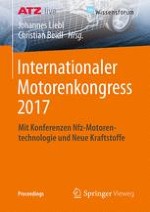2017 | OriginalPaper | Chapter
48 V in series application
Authors : Jens Kötz, Siegfried Pint
Published in: Internationaler Motorenkongress 2017
Publisher: Springer Fachmedien Wiesbaden
Activate our intelligent search to find suitable subject content or patents.
Select sections of text to find matching patents with Artificial Intelligence. powered by
Select sections of text to find additional relevant content using AI-assisted search. powered by
The number of mechatronic systems on-board motor vehicles has risen sharply in recent years. Increasing connectivity, integration of new functions and ever more stringent demands in terms of CO2 reduction have driven this trend and focused attention on future requirements in automotive development.Digitization, urbanization and sustainability are the new strategic factors which are shifting the focus to the development of electrified systems, thereby closing the gap between conventional combustion engines and efficient high-voltage vehicles.An intelligent, highly interconnected drive train and operating concept as the enabler of new, future-proof CO2 reduction functions combined with a substantially higher powered electrical system with more intensive functionality is needed and is being introduced into series production.The cost of such a new concept needs to be less than that of a high-voltage system, and the concept has to offer more functionality than a conventional present-day vehicle.These are ambitious goals, demanding extensive convergence of the drive train and the energy network. The groundwork has been laid for the integration of the 48 V system.This new voltage level, which is characterized by higher power and improved storage capacity, is increasingly attracting attention for applications beyond the drive train. Chassis control systems, such as electric roll stabilizers, or consumers such as electric drive compressors are also enjoying the superior performance and the new possibilities that are opening up.Consequently, energy-intensive functions to reduce CO2 emissions are coming up against output-intensive control systems delivering high dynamics. The delicate balance required is analyzed and the scalable solution variants are presented.An intelligent operating strategy ensures an energy equilibrium within the vehicle and combines efficiency with driving experience. Yet the route to a production-ready power system topology for the broad range of vehicle concepts entails detail aspects which are often neglected.Issues such as crash safety, availability of supply to safety-related components and cross-system connectivity are proving highly complex, and demand a degree of process discipline in view of the need to rollout functionality across entire model series with different engine / transmission variants in a wide variety of different countries and specifications.An interdisciplinary approach is needed in order to spread the multiplicity of new tasks and focus concerted efforts on the shared goal. Cross-functional testing and integration planning, extending as far as closely linked functional and expert teams, must be established in order to progress a sustainable global electrification strategy to production maturity.
